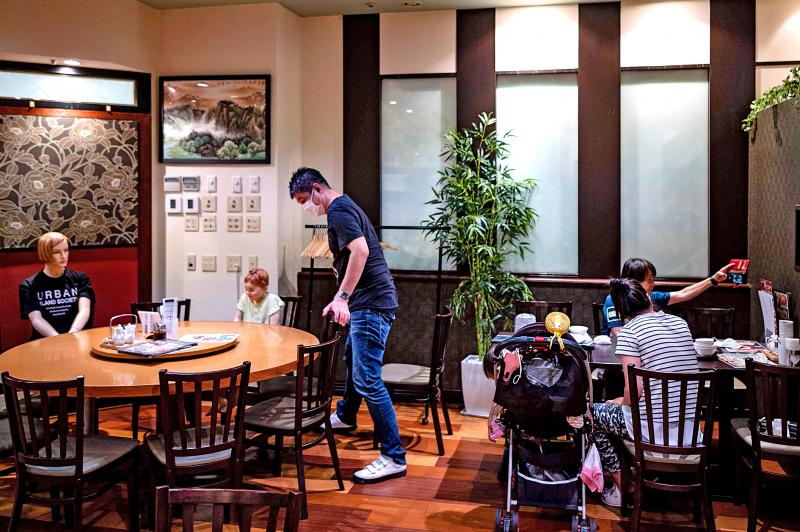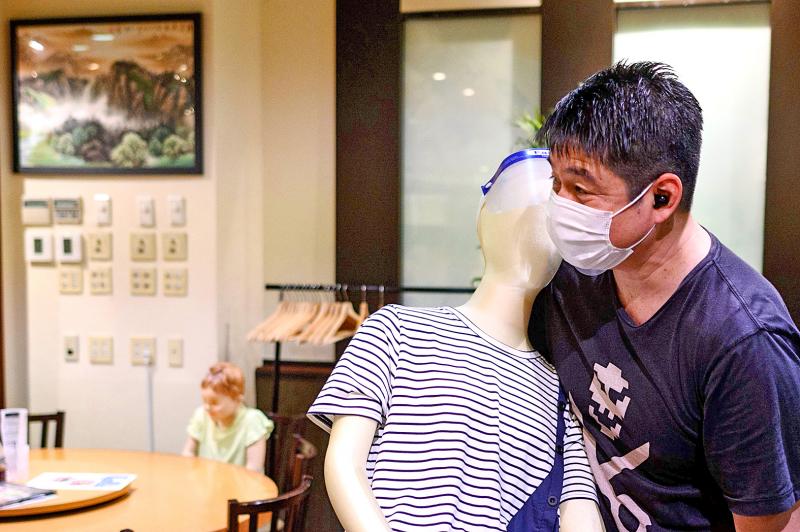The coronavirus pandemic might have left many restaurants empty, but one establishment in Tokyo is relying on some model customers to enforce social distancing: life-like mannequins keeping diners from getting too close.
Masato Takemine’s Chinese restaurant looks busy even as many businesses in the city deal with a dearth of clientele, with ladies in ornate Chinese-style dresses and a girl in a kimono among those seated at his tables.
But the 16 customers are actually mannequins he has placed randomly at tables to keep diners from getting too close.

Photo: AFP
“At first I removed some of the tables to have more space in between, but it then looked so lonely, as if the restaurant was under renovation,” Takemine said.
“With these mannequins, the restaurant looks busy from the outside, and I can make sure customers are distancing themselves. “It’s also fun, giving us a jolly feeling,” he giggled.
While Japan has avoided the devastating tolls in places hit hardest by the coronavirus, many restaurants shut their doors during a state of emergency and even after it was lifted in May, the industry has seen customers shun eating out.

Photo: AFP
Takemine’s restaurant Kirin Saikan in downtown Tokyo reopened in late May but sees about half the number the customers it did before the virus, he said.
Among those returning was 51-year-old Tetsuya Kimura, who said he was startled when he walked through the entrance curtains for the first time after the reopening and saw the mannequins.
“These dolls look so real that I need some time to get used to them,” he said, tucking into a bowl of noodles at a table he was sharing with a child mannequin.
Takeichi Otomo, 82, another frequent customer at the restaurant, said he struggled to not look too shocked at the beginning.
“I still get startled when I come here,” he said with a straight face. “This is a crazy idea!”
While the mannequins keep the restaurant from feeling too empty, Takemine said he often thinks with longing about when his customers could visit with family and friends and enjoy carefree laughs and chats over platters to share.
“I don’t think we can go back to those times for many months,” he said. “I am just hoping we will return to normal while creating an environment where people can eat and drink safely.”

This is the year that the demographic crisis will begin to impact people’s lives. This will create pressures on treatment and hiring of foreigners. Regardless of whatever technological breakthroughs happen, the real value will come from digesting and productively applying existing technologies in new and creative ways. INTRODUCING BASIC SERVICES BREAKDOWNS At some point soon, we will begin to witness a breakdown in basic services. Initially, it will be limited and sporadic, but the frequency and newsworthiness of the incidents will only continue to accelerate dramatically in the coming years. Here in central Taiwan, many basic services are severely understaffed, and

Jan. 5 to Jan. 11 Of the more than 3,000km of sugar railway that once criss-crossed central and southern Taiwan, just 16.1km remain in operation today. By the time Dafydd Fell began photographing the network in earnest in 1994, it was already well past its heyday. The system had been significantly cut back, leaving behind abandoned stations, rusting rolling stock and crumbling facilities. This reduction continued during the five years of his documentation, adding urgency to his task. As passenger services had already ceased by then, Fell had to wait for the sugarcane harvest season each year, which typically ran from

It is a soulful folk song, filled with feeling and history: A love-stricken young man tells God about his hopes and dreams of happiness. Generations of Uighurs, the Turkic ethnic minority in China’s Xinjiang region, have played it at parties and weddings. But today, if they download it, play it or share it online, they risk ending up in prison. Besh pede, a popular Uighur folk ballad, is among dozens of Uighur-language songs that have been deemed “problematic” by Xinjiang authorities, according to a recording of a meeting held by police and other local officials in the historic city of Kashgar in

It’s a good thing that 2025 is over. Yes, I fully expect we will look back on the year with nostalgia, once we have experienced this year and 2027. Traditionally at New Years much discourse is devoted to discussing what happened the previous year. Let’s have a look at what didn’t happen. Many bad things did not happen. The People’s Republic of China (PRC) did not attack Taiwan. We didn’t have a massive, destructive earthquake or drought. We didn’t have a major human pandemic. No widespread unemployment or other destructive social events. Nothing serious was done about Taiwan’s swelling birth rate catastrophe.